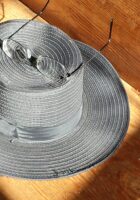Poem of the Week | September 11, 2023

“Self-Portrait as a Woman Halved” by Carolina Hotchandani
This week’s Poem of the Week is “Self-Portrait as a Woman Halved” by Carolina Hotchandani.
Carolina Hotchandani is a Latinx/South Asian poet who grew up primarily in the American South. She won the 2023 Perugia Press Prize for her debut poetry collection, The Book Eaters, which is released September 15, 2023. Her poetry has appeared in AGNI, Alaska Quarterly Review, Blackbird, Beloit Poetry Journal, Cincinnati Review, Poetry Northwest, Prairie Schooner, West Branch, and other journals. She is a Goodrich Assistant Professor of English in Omaha, Nebraska.
Self-Portrait as a Woman Halved
What seems a long time ago, a line of pigment
drew itself down the middle of my torso—
linea nigra, splitting the globe of my belly
into hemispheres: I am East, and I am West,
child of parents from both sides of the world.
Brazil is my mother’s motherland.
Land of the pau-Brasil, the tree that gave
the country its name—its red sap
extracted by those who were enslaved. They
powdered the sap to make a dye, connoting
power in European fabrics. Power powder.
My father is Indian—land of cinnamon
and clove, land of spices the Portuguese
sailed East for, land of the tea the English
mass-produced so that Indians
now drink it with milk, as my father does,
as I’ve learned to do. The line that breaks me
in two is neater than I thought natural things
could be. Once the baby’s born, the thin strip
slowly fades. But I’ll look at my child—
her skin whiter than mine—
and feel divided. Afraid the world
will grant her an ease that keeps her
from knowing me. Glad, too,
for that same reason.
Author’s Note
Though I have moved through the world as a woman of color with a multicultural heritage for as long as I’ve been alive, it was surprising, when my daughter was born, to see my ethnicity through new eyes. I had never felt split between two cultures when I was growing up: we spoke Portuguese and ate rice and beans in our home; my extended family cooked delicious Indian food and spoke Sindhi. These cultures were interwoven; they brought my life a richness that I appreciated. When I gave birth to a white-passing infant, however, her whiteness brought into relief my “brownness” in the eyes of the world. It is this experience–of being strangely bisected as a new mother–that I explore in this poem.
SEE THE ISSUE
SUGGESTED CONTENT

Poem of the Week
May 13 2024
“The Sacrifice of Isaac” by Chris Ketchum
“The Sacrifice of Isaac” by Chris Ketchum is our Poem of the Week. Chris Ketchum is from Moscow, Idaho. He received an MFA from Vanderbilt University and is a PhD… read more

Poem of the Week
May 06 2024
“from Elam House (Austin, Minnesota)” by G.C. Waldrep
“from Elam House (Austin, Minnesota)” by G.C. Waldrep is our Poem of the Week. G.C. Waldrep’s most recent books are feast gently (Tupelo, 2018), winner of the William Carlos Williams… read more

Poem of the Week
Apr 29 2024
“This Body is a Songbird in a Kiln” by Athena Nassar
“This Body is a Songbird in a Kiln” by Athena Nassar is our Poem of the Week. Athena Nassar is an Egyptian-American poet, essayist, and short story writer from Atlanta,… read more

